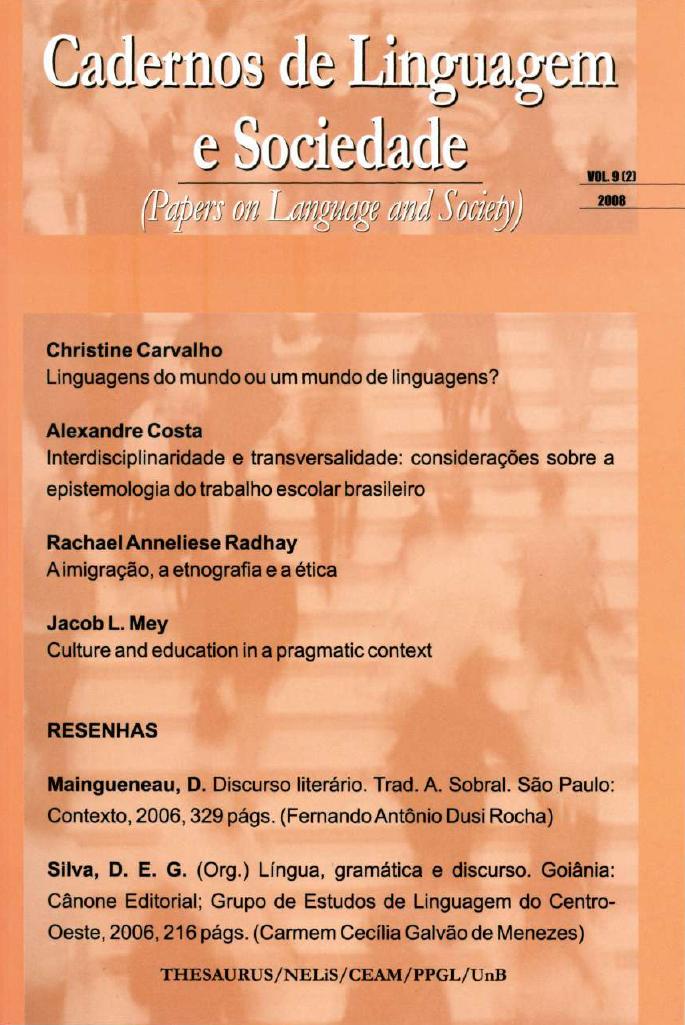A imigração, a etnografia e a ética
DOI:
https://doi.org/10.26512/les.v9i2.9244Palavras-chave:
Immigration. Ethnography. Ethics. Discourse.Resumo
The relation between discourse and power in Brazilian immigration is complex. There is the public sphere with the State’s immigration officials. There are also migrants in the intricacies of their worlds. Discourse and power refer to hierarchies of contexts and relations in which multiple truths are constructed vis à vis immigration. There is marked discrimination in the representation and evaluation of immigrants. Those with high investments or specialist knowledge are welcome whilst those who are socially underprivileged are valueless. All these issues can be considered through ethnography. However, delving ethnographically into the complexities of immigration stirs up ethical issues.
Downloads
Referências
Adams, L. The mascot researcher. Identity, power and knowledge in fieldwork. Journal of Contemporary Ethnography, 28 (4): 331-363, 1999.
Baez, B. Confidentiality in qualitative research. Reflections on secrets, power and agency. Qualitative Research, 2 (1): 35-38, 2002.
Bauman, Z. Comunidade. Trad. P. Dentzien. Rio de Janeiro: Jorge Zahar Editor, 2003.
Berger, L. Inside out. Narrative ethnography as a path toward report. Qualitative Inquiry, 7 (4): 504-518, 2001.
Bhabha, H. The location of culture. Londres, Nova York: Routledge, 1994.
Cameron, D.; Frazer, E.; Harvey, P.; Rampton, B.; Richardson, K. Power/Knowledge. The politics of social science. In: Jaworski, A.; Coupland, N. The discourse reader. Londres, Nova York: Routledge, 1999, pp. 141-57.
Chouliaraki, L. Writing up a classroom ethnography. Issues on interpretation and representation in ethnographic narratives. Working Paper Series of the Lancaster Centre for Language in Social Life, 1994.
Chouliaraki, L. Media discourse and the public sphere. D.E.L.T.A., 21: Especial: 45-71, 2005.
Chouliaraki, L.; Fairclough, N. Discourse in late modernity. Rethinking critical discourse analysis. Edimburgo: Edinburgh University Press, 1999.
Dimitriadis, G. Coming clean at the hyphen. Ethics and dialogue at a local community center. Qualitative Inquiry, 7 (5): 578-597, 2001.
Drury, J. Cognitive science and hermeneutic explanation. Symbiotic or incompatible frameworks? Philosophy, Psychiatry and Psychology, 1: 40-50,1994.
Drury, J.; Stott, C. Bias as a research strategy in participant observation. The case of intergroup conflict. Field Methods, 13 (1): 47-67, 2001.
Fairclough, N. Researching discourse. Textual analysis for social research. Londres, Nova York: Routledge, 2003.
Giddens, A. A terceira via. Trad. M. L. Borges. Rio de Janeiro, São Paulo: Record, 2001.
Gieve, S.; Magalhães, I. On empowerment. In: Gieve, S. & Magalhães, I. (Orgs.). Power, ethics and validity. Issues in the relationship between researcher and researched. Centre for Research in Language Education, Crile Occasional Report, 6. Lancaster University, 1994 (1998).
Habermas, J. A inclusão do outro. Trad. G. Sperber; P. A. Soethe; M. C. Mota. São Paulo: Loyola, 2002.
Henry, G. ‘Where are you really from’? Representation, identity and power in the fieldwork experience of a South Asian diasporic. Qualitative Research, 3 (2): 229-242, 2003.
Josselson, R.; Lieblich, A. (Orgs.) The narrative study of lives. Vol. 1. Newbury Park, Londres, Nova Délhi: Sage Publications, 1993.
Leif, C. G; Cytrynbaum, J. D. Illuminating spaces. Relational spaces, complicity, and multisited ethnography. Field Methods, 15 (3): 252-270, 2003.
Nilan, P. ‘Dangerous fieldwork’ re- examined. The question of researcher subject position. Qualitative Research, 2 (3) : 363 ”“ 386, 2002.
Roberts, C. Professional gatekeeping in intercultural encounters. In: Sarangi, S. & Coulthard, M. (Orgs.) Discourse and social life. Pearson Education, 2000: 102-119.
Sherif, B. The ambiguity of boundaries in the fieldwork experience. Establishing rapport and negotiating insider and outsider status. Qualitative Inquiry, 7 (4): 436-447, 2001.
Springwood, F. C.; King, R. C. Unsettling engagements. On the ends of rapport in critical ethnography. Qualitative Inquiry, 7 (4): 403-417, 2001.
Thomas, J. Doing critical ethnography. Newbury Park, Londres, Nova Délhi: Sage Publications, 1993.
Van Maanen, J. Tales of the field. On writing ethnography. Chicago, Londres: The University of Chicago Press, 1988.
Downloads
Publicado
Como Citar
Edição
Seção
Licença
Autores/as que publicam nesta revista concordam com os seguintes termos:
Autores/as mantêm os direitos autorais e concedem à revista o direito de primeira publicação, sendo o trabalho simultaneamente licenciado sob a Creative Commons Attribution 4.0 International license que permite o compartilhamento do trabalho com reconhecimento da autoria do trabalho e publicação inicial nesta revista.



